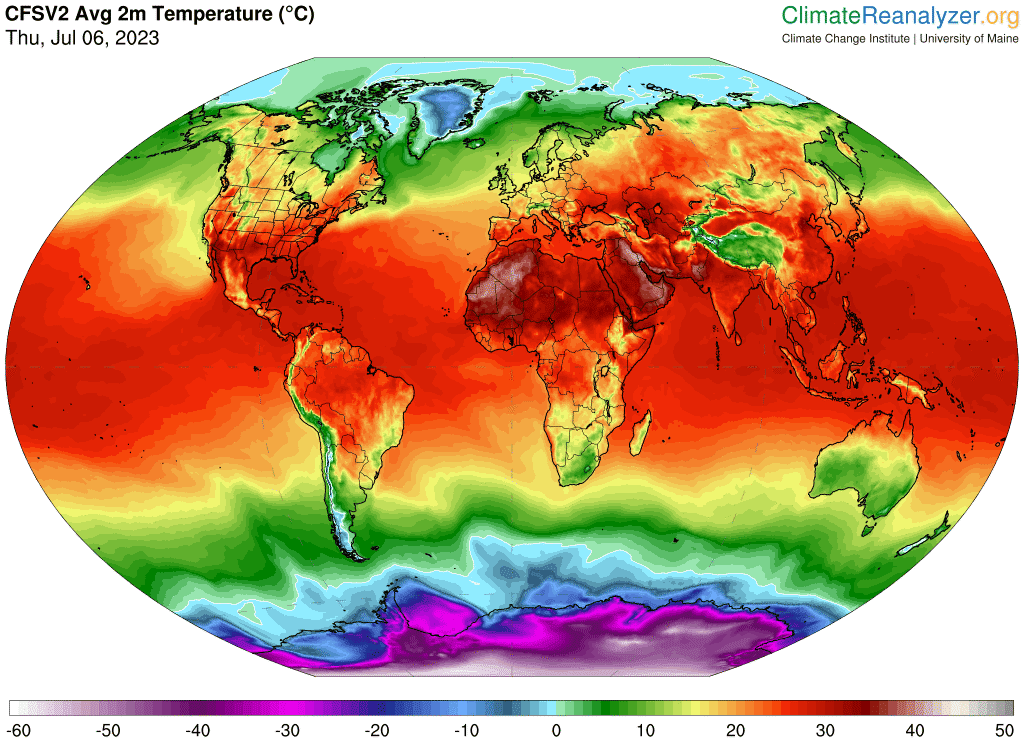It’s time to start taking the climate crisis more seriously. On Wednesday, the global average temperature hit its highest level since records began breaking a previously broken record on Monday and Tuesday this week. The global average temperature rose to 17.23 degrees Celsius, according to the University of Maine Climate Reanalyzer, a tool widely used by climate scientists.

Climate scientists attributed the temperature record to greenhouse gas emissions pushing up global temperatures, the start of summer in the Northern Hemisphere and the return of the El Nio climate phenomenon. They warned that further records could continue to be broken in the coming months due to a combination of the same factors.
The Climate Reanalyzer, operated by the University of Maine, evaluates mean global temperature through surface, balloon and satellite observations, along with computer models. While the readings obtained are not considered an official government document, they are highly regarded and considered a reliable source.
Global average temperatures reached 17.01 degrees Celsius on Monday and 17.18 degrees Celsius on Tuesday. Before that, the previous record was 16.92 degrees Celsius, set on August 14, 2022. Friederike Otto, a climate scientist, told the BBC this should be a wake-up call “to anyone who thinks the world has need more oil and gas”.
Monday July 3 was the hottest day ever recorded on Planet Earth. A record that lasted until Tuesday, July 4, Bill McGuire, a climate risk researcher wrote on Twitter. But Wednesday turned out to be even hotter and we’re not even halfway through summer.
Record the time
Temperatures show significant variations across the planet, particularly on land, both geographically and seasonally. Warmer temperatures tend to prevail closer to the tropics, while colder temperatures dominate the polar regions. Scientists rely on global average temperatures to gain valuable insights into dynamic changes on Earth.
Global warming is leading us into an unknown world, Robert Rohde, chief scientist of environmental data analysis group Berkeley Earth, he wrote on Twitter. He said that while the Reanalyzer dates only to 1979, other datasets that go further back conclude that this day was hotter than any time since instrumental recordings began.
The record is partly explained by climate change causing the world to warm, with global temperatures already rising 1.25 degrees Celsius above the pre-industrial average. Indeed, last year climate experts from the United Nations warned that the planet was on track to exceed the agreed global goal of keeping global warming to 1.5 degrees Celsius.
But that’s not the only reason. The World Meteorological Organization (WMO) has already declared the return of El Nio, a natural climate pattern that occurs every two to seven years. El Nio could lead to a further rise in global temperatures and extreme weather, making the world even more likely to reach 1.5.
The onset of El Nino will greatly increase the likelihood of breaking temperature records and triggering more extreme heat in many parts of the world and in the ocean, WTO Secretary-General Petteri Taalas said in a statement, calling on governments to take action to limit impacts on ecosystems, health and economies.
The news follows a series of extreme weather events across the planet in recent months. China recorded the most warm days this week in six months since records began. Spain and Portugal recorded their warmest April temperatures amid a heat wave. And Mexico and the southern United States have recorded 14 deaths due to record temperatures.
Thanks for your feedback!
#Earth #reaches #hottest #day #record #days #row
Image Source : www.zmescience.com
